Closing the Gap: Educators Gather for 2025 Early College Summit
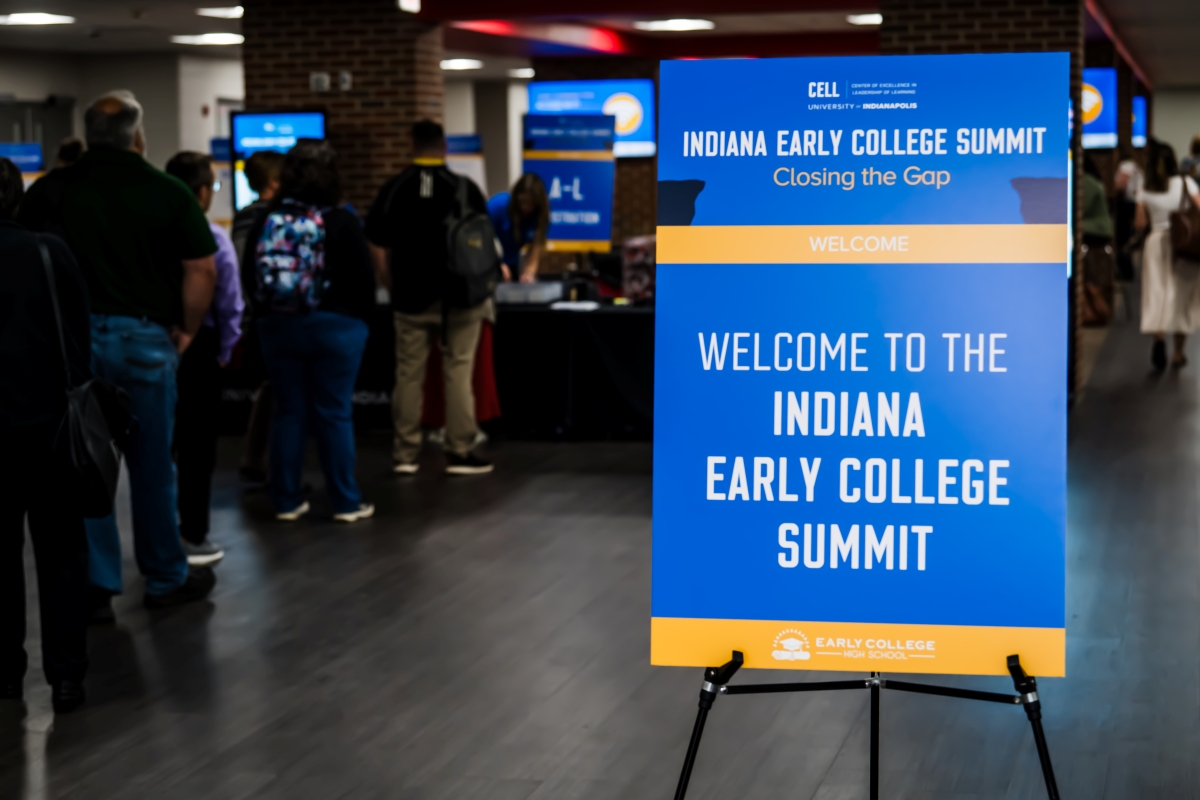
On June 4, nearly 500 educators and school leaders gathered at New Palestine High School for the 2025 Indiana Early College Summit. Hosted by the Center of Excellence in Leadership of Learning (CELL) at the University of Indianapolis, the event marked a record year for attendance and energy. Now in its third year, the Summit focused on expanding high school students’ access to college and career pathways through the Early College framework.
The event’s theme, “Closing the Gap,” emphasized the need for improving access to and success in education beyond high school. Participants represented 65 Indiana school districts, 54 counties, and eight states, showing the growing interest in Early College.
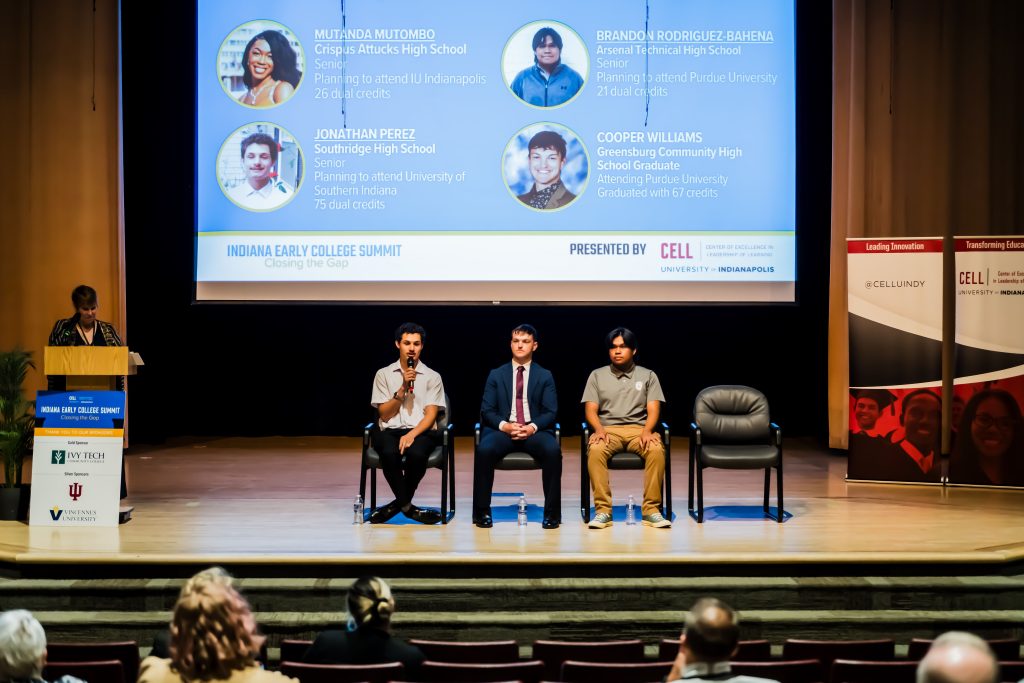
“Since I was young, college was on my mind. But being a first-generation student, I wasn’t sure how to make it happen. Because of Early College, it was no longer a question.”
-Jonathan perez, student, southridge high school
Elevating Student Voices
The event opened with one of its most powerful moments: a student panel featuring Brandon Rodriguez of Arsenal Technical High School, Cooper Williams of Greensburg Community High School, and Jonathan Perez of Southridge High School. Speaking to a packed auditorium, they reflected on their Early College experience and offered advice to help more students. Together, the trio earned 163 college credits before finishing high school—a testament to what Early College makes possible.
“Since I was young, college was on my mind,” Perez said. “But being a first-generation student, I wasn’t sure how to make it happen. Because of Early College, it was no longer a question. The path forward was right in front of me. Now I’m sitting at a place no one in my family ever has.”
“It’s really hard to take care of kids if we’re not taking care of the adults taking care of the kids.”
-dr. Joe sanfelippo, keynote speaker and former superintendent
Standing Ovations and Milestone Moments
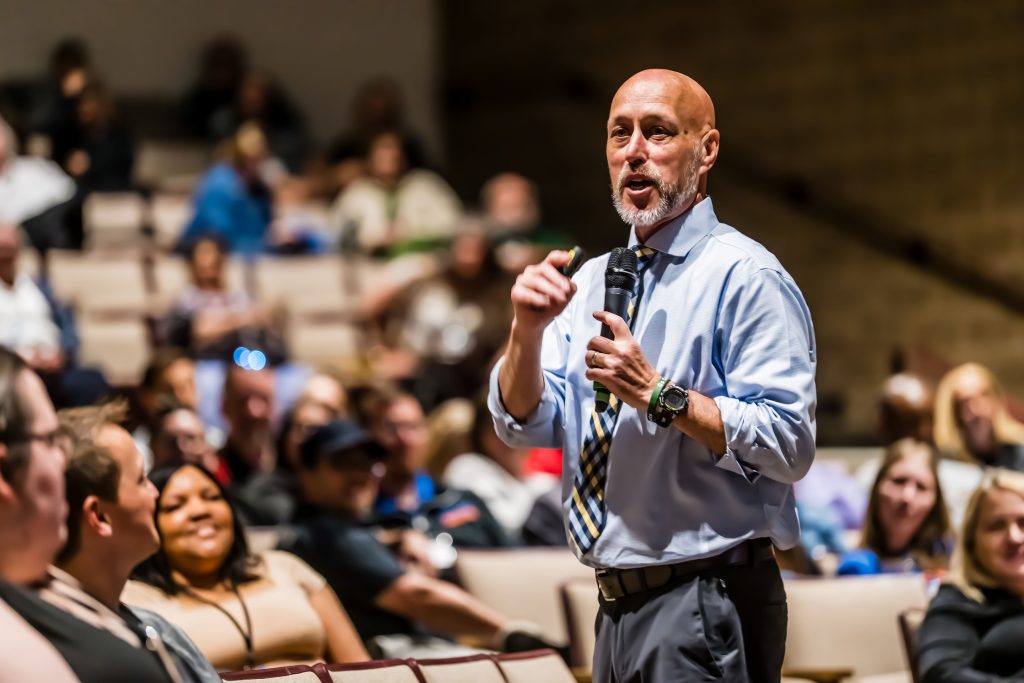
The 2025 Summit wasn’t just about sharing ideas—it was about celebrating the people bringing them to life.
Dr. Joe Sanfelippo, a retired Wisconsin school superintendent and national education leader, gave a dynamic keynote challenging attendees to stop thinking of themselves as “just” a school leader, teacher, paraprofessional, or custodian. Every moment, he reminded the audience, can shape school culture and impact lives. He posed a powerful question: What are you doing to recognize, acknowledge, and extend the greatness of your colleagues?
“The answer to this question is important,” he said, “because it’s really hard to take care of kids if we’re not taking care of the adults taking care of the kids.”
His enthusiasm and encouragement brought the room to its feet.
Another standing ovation came while honoring Janet Boyle, who announced her retirement after more than 40 years in education. Boyle has been a pioneer in Indiana’s Early College movement, first as a school district administrator and later as a leader at CELL. She played a vital role in developing the Early College endorsement process and secured the state’s first federal funding for expanding the model through the Rural Early College Network (RECN). Her leadership has shaped every Early College program operating in Indiana today.
The 2025 Summit delivered 39 breakouts and school showcases, plus 19 micro-learning sessions, all packed with practical ideas from the field.
Practical Solutions from the Field
The 2025 Summit delivered 39 breakouts and school showcases, plus 19 micro-learning sessions, all packed with practical ideas from the field. What sets the event apart is its focus on peer-to-peer learning. Attendees heard from 32 Indiana high schools and districts sharing how they’ve made the Early College model work in their communities.
Showcase sessions walked through unique program designs, while micro-learning sessions delivered quick, 20-minute presentations focused on one of the eight Early College core principles. Topics ranged from scheduling and staffing to student support and partnerships. Each session provided a clearer picture of what Early College looks like in action and offered tools to take back and use.
Sessions also tackled broad-based issues across Indiana schools. Teams explored how to meet new diploma requirements, improve work-based learning, use artificial intelligence, and give younger students access to dual credit courses.
The Summit’s spotlight speaker sessions, featuring some of the country’s leading voices in Early College, gave participants a national perspective. Dr. Julie Edmunds and Dr. Nina Arshavsky of the Early College Research Center, part of the SERVE Center at the University of North Carolina at Greensboro, shared research on rigorous instruction, student outcomes, and program sustainability. Alex Perry of the College in High School Alliance talked about national dual credit trends and funding. Dr. Jon Turner of Missouri State University shared research on how four-day school weeks are benefiting districts of all sizes. Mario Bracamontes of the Pharr-San Juan-Alamo Independent School District in Texas offered curricular content tips for supporting literacy and sustainability in Early College classrooms. These national insights gave Indiana’s education leaders broader context and innovative ideas to strengthen this work locally.
“We’re all given a purpose. Use your passions in the classroom and let those reflect onto the kids.”
-Ben Kent, career and technical education teacher, shoals high school
Common Themes and Innovations
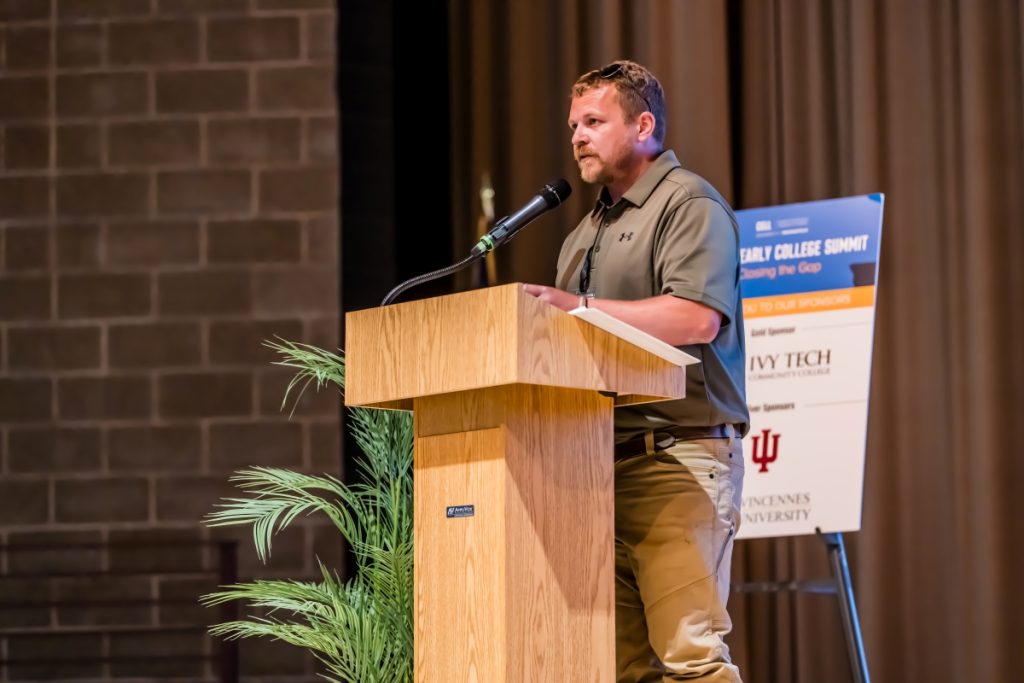
Across the day’s sessions, several themes emerged. School teams emphasized the importance of adapting the Early College model to fit local needs, recognizing that implementation looks slightly different in every community. Presenters also stressed that strong partnerships—with postsecondary institutions, local industries, and community groups—are essential to helping students succeed both in high school and beyond.
The school counselor panel highlighted the growing need for systems that extend beyond academics to support the whole student. With new diploma requirements, Career Discovery Meetings, and dual credit requirements, counselors now play a bigger role than ever in helping students plan their future. Their role also extends to families—many unfamiliar with the college process—in helping them feel comfortable with the decisions ahead.
Hands-on learning and the importance of working beyond textbooks took center stage with Ben Kent, a career and technical education teacher at Shoals High School. A former construction worker turned educator, Kent shared how his students prepare for college and careers through real-world projects. They pour concrete, build furniture, grow food, and even run a small farm—built entirely from community donations. His message to fellow educators was simple: bring your passion to the classroom.
“We’re all given a purpose,” Kent said. “Use your passions in the classroom and let those reflect onto the kids.”
Indiana is not just participating in the national Early College conversation. It’s helping lead it.
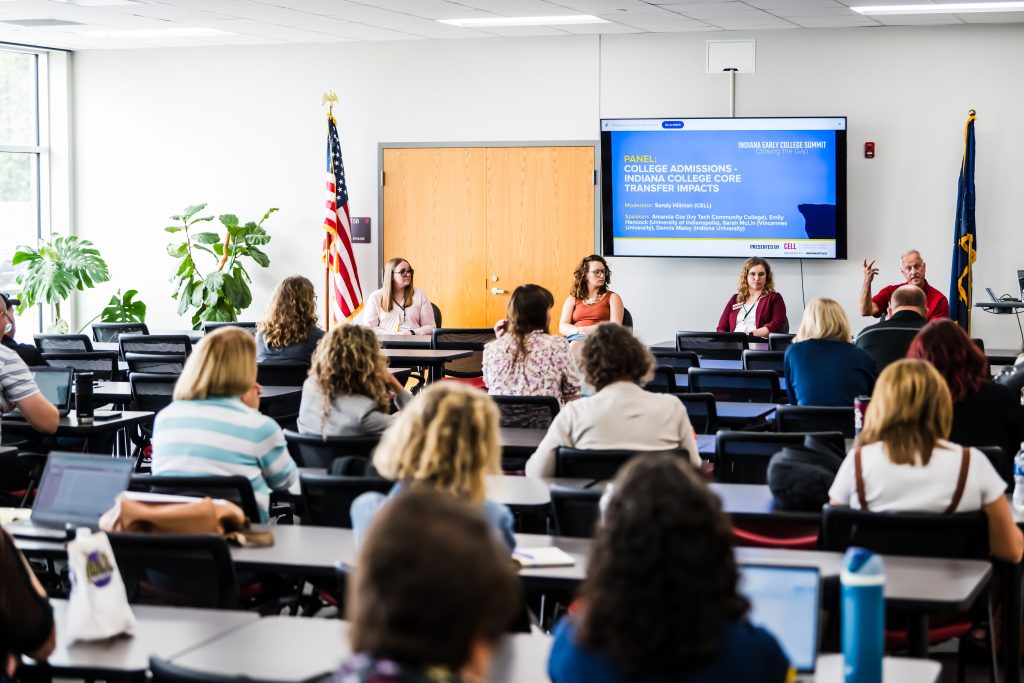
A Model Others Are Watching
Throughout the Summit, in formal sessions and hallway conversations, it became undeniable that Indiana is not just participating in the national Early College conversation. It’s helping lead it.
With 68 endorsed Early College High Schools and more than 40 others in development, CELL has built a network that few other states can match. These programs span rural towns, urban neighborhoods, and fast-growing suburban communities. They reach students with barriers to pursuing and succeeding in college, making higher education and high-demand careers both accessible and achievable.
At the heart of this success is CELL’s Early College endorsement process, which provides schools with a clear, research-based framework for implementation. The process sets a high standard while supporting schools in adapting the model to fit their unique student, staffing, and community needs. It’s a big part of what makes Indiana’s Early College approach a national standout.
Indiana is well-positioned to expand the Early College model so that every student has access to college-level coursework, career preparation, and lifelong success.
The Path Forward
As the event wrapped up, participants described feeling energized and ready to “get back to work” on Early College as they look ahead to the 2025-26 academic year. With strong policy support, growing community involvement, and a network of educators supporting each other, Indiana is well-positioned to expand the Early College model so that every student has access to college-level coursework, career preparation, and lifelong success.
For every district involved in these efforts—and those preparing to take the next step— “Closing the Gap” is much more than a summit theme. It’s a daily commitment.
—
CELL and the Early College team would like to thank New Palestine High School for hosting the event and Ivy Tech Community College, Indiana University, and Vincennes University for their generous sponsorship. Thank you for helping make the Early College Summit possible!
To learn more about the Early College model, visit https://cell.uindy.edu/our-work/early-college-high-school/ or contact Steve Combs, CELL’s director of Early College, at combss@uindy.edu.
Mark your calendar for the next Indiana Early College Summit, set for June 2026.
